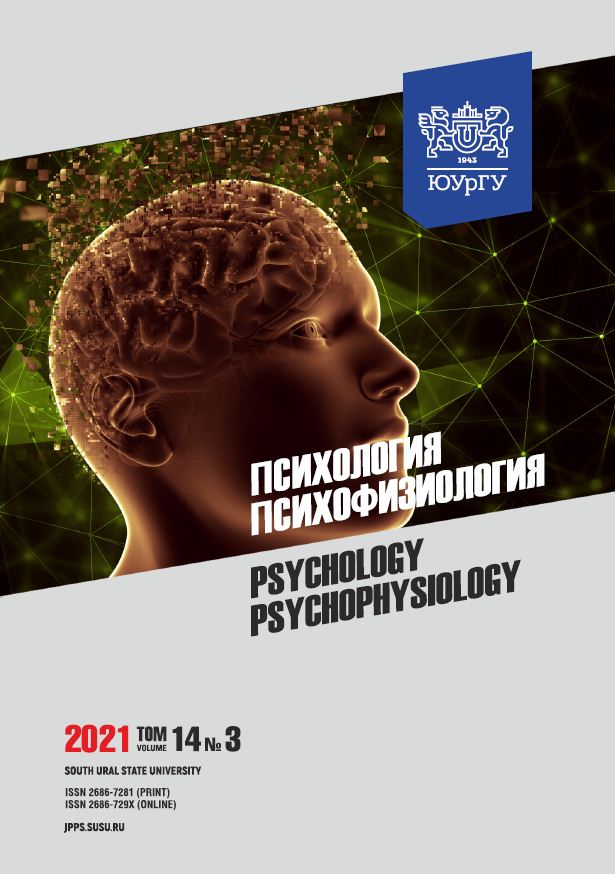PERSONAL VALUES AND CHANGES IN VALUE PRIORITIES IN A SITUATION OF UNCERTAINTY (ON THE EXAMPLE OF THE COVID-19 PANDEMIC)
Abstract
Abstract. The relevance of the topic of tolerance to uncertainty is of particular importance during the pandemic. In theoretical terms, this situation makes it possible, within the framework of a natural experiment, to shed light on some patterns of personal changes in the conditions of growing uncertainty. Aim: the aim of the study was to identify changes in the structure and foundation of tolerance to uncertainty associated with the COVID-19 pandemic. Materials and methods. A comparative analysis of demographically comparable samples was performed before and during quarantine. The hierarchy of values (value ranking methodology), tolerance to uncertainty (MSTAT-1), and a survey were used for the purpose of the study. 348 respondents (198 men and 150 women) participated in the experiment. Results. The quarantine showed the stability of top value structures and the absence of rapid changes even under the influence of the pandemic. However, some changes were found associated with a greater importance of low-level values. Thus, the quarantine increased the importance of security and basic vital needs as opposed to such values as power and social status. In general, the level of a person's tolerance to uncertainty increased, thus, contributing to the changes in the relationship between the components of uncertainty and personal values. Conclusion. The stability of value structures in the situation of increasing uncertainty is associated with certain changes in both the middle-level values and the foundation of a person's tolerance to uncertainty.
Downloads
References
2. Bratus B.S. To the study of the semantic sphere of personality. Vestnik Moskovskogo universiteta. Seriya 14. Psikhologiya = Moscow University Bulletin. Series 14. Psychology. 1981; 2: 46–56. (in Russ.).
3. Zinchenko V.P. Tolerance to Uncertainty: News or Psychological Tradition? Voprosy psikhologii. 2007; 6 (3): 3–20. (in Russ.). https://www.elibrary.ru/item.asp?id=19134703
4. Salikhova N.R. The construction of life by the subject: self-regulation and / or self-organization. Uchenye zapiski Kazanskogo universiteta. Seriya Gumanitarnye nauki = Scientific notes of Kazan University. Humanities Series. 2012; 154 (6): 268–279. (in Russ.). https://www.elibrary.ru/ item.asp?id=18772259
5. Salikhova N.R. Professional choice and realizability of personal values in adolescence. Kazanskii pedagogicheskii zhurnal = Kazan pedagogical journal. 2008; 4: 3–12. (in Russ.). https://www.elibrary.ru/item.asp?id=12806451
6. Salikhova N.R. Value foundations of an individuals tolerance to uncertainty. Vestnik Vyatskogo gosudarstvennogo universiteta = Vyatka State University Bulletin. 2020; 2 (136): 132–141. (in Russ.). https://www.elibrary.ru/item.asp?id=44039246
7. Epishin V.E., Salikhova A.B., Bogacheva N.V. et al. Mental Health and the COVID-19 Pandemic: Hardiness and Meaningfulness Reduce Negative Effects on Psychological Well-Being. Psychology in Russia: State of the Art. 2020; 13 (4): 75–88. DOI: 10.11621/pir.2020.0405.
8. Asmolov A.G., Shekhter E.D., Chernorizov A.M. Preadaptation to uncertainty as a navi-gation strategy for developing systems: routes of evolution. Voprosy psikhologii. 2016; 2: 3–23. (in Russ.). https://www.elibrary.ru/item.asp?id=32324593
9. Abakumova I.V., Godunov M.V., Golubova V.M. Theoretical approaches to the study of the effects of uncertainty in the processes of semantic regulation of personality development. Rossiiskii psikhologicheskii zhurnal = Russian psychological journal. 2019; 16 (3): 59–71. (in Russ.). https://www.elibrary.ru/item.asp?id=41521016
10. Sokolova E.T. Cultural-historical and clinical-psychological perspective of the study of the phenomena of subjective uncertainty. Vestnik Moskovskogo universiteta. Seriya 14. = Moscow University Bulletin. Episode 14. 2012; 2: 37–48. (in Russ.). https://www.elibrary.ru/item.asp?id=17888763
11. Leontiev D.A. Life on the Waves of Chaos: Lessons from Prigogine and Taleb. Mobilis in mobile: lichnost v epokhu peremen. Mobilis in mobile: personality in an era of change. Ed. A. Asmolov. Moscow. YaSK. 2018: 29–39. (in Russ.).
12. Alishev B.S. Psyche and overcoming uncertainty. Psikhologiya. Zhurnal vysshei shkoly ekonomiki = Psychology. Journal of the Higher School of Economics. 2009; 6 (3): 3–26. (in Russ.). https://www.elibrary.ru/item.asp?id=17879323
13. Asmolov A.G. Psychology of modernity: the challenges of uncertainty, complexity and diversity. Psikhologicheskie issledovaniya: elektronnyi nauchnyi zhurnal = Psychological research: electronic scientific journal. 2015; 8 (40) (in Russ.). https://www.elibrary.ru/item.asp?id=23593078
14. Leontiev D.A. Uncertainty Challenge as a Central Problem of Personality Psychology. Psikhologicheskie issledovaniya: elektronnyi nauchnyi zhurnal = Psychological research: electronic scientific journal. 2015; 8 (40). (in Russ.). https://www.elibrary.ru/item.asp?id=23593079
15. Kornilova T.V., Chumakova M.A., Kornilov S.A., Novikova M.A. Psychology of Uncertainty: The Unity of Human Intellectual and Personal Potential. Moscow. Smysl. 2010: 334 (In Russ.).
16. Lazarus R.S., Folkman S. Stress, appraisal and coping. N.Y. Springer Publishing Company. 1984: 456.
17. Leonov I.N. Tolerance to uncertainty as a psychological phenomenon: the history of the formation of a construct. Filosofiya. Psikhologiya. Pedagogika = Philosophy. Psychology. Pedagogy. 2014; 4: 43–52. (in Russ.). https://www.elibrary.ru/item.asp?id=23166509
18. Timoshchenko A.S., Gryazeva, Dobshinskaya V.G., Dmitrieva Yu.A. Adaptive Resources of Subjects with Different Strategies for Choosing a Way of Life in a Stress Situation of Organizational Changes. Psychology. Psychophysiology = Psychology. Psychophysiology. 2020; 13 (4): 49–57. (in Russ.). DOI: 10.14529/jpps200406
19. Kornilova T.V. The principle of uncertainty in the psychology of choice and risk. Psikhologicheskie issledovaniya = Psychological research. 2015; 8 (40): 3. (in Russ.). https://www.elibrary.ru/item.asp?id=23593080
20. Fantalova E.B. On one methodological approach to the study of motivation and internal conflicts. Psikhologicheskii zhurnal = Psychological journal. 1992; 13 (1): 107–117. (in Russ.).
21. Leontiev D.A., Osin E.N., Lukovitskaya E.G. Diagnosis of Uncertainty Tolerance: D. MacLane Scales. Moscow. Smysl. 2016: 60. (in Russ.). https://www.elibrary.ru/item.asp?id=44492055
References on translit
-Copyright (c) 2022 Psychology. Psychophysiology

This work is licensed under a Creative Commons Attribution-NonCommercial-NoDerivatives 4.0 International License.



